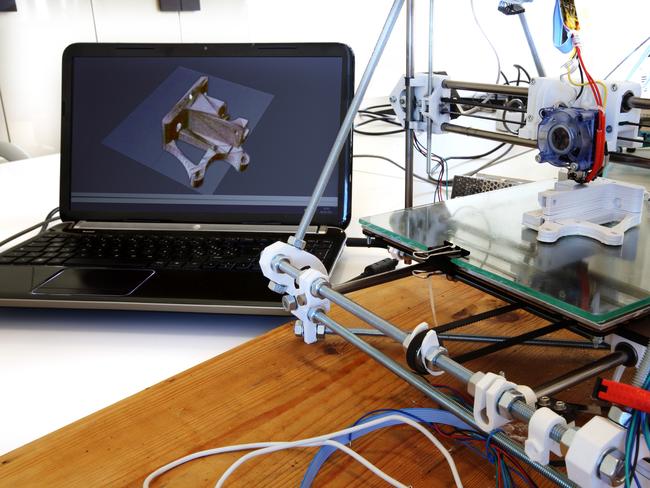Future jobs: Emerging roles from robot ethicists to cricket farmers
From robot ethicists to cricket farmers and digital implant designers, the careers of the future will involve jobs that seem inconceivable. These are the skills you will need to find work in the future.

Careers
Don't miss out on the headlines from Careers. Followed categories will be added to My News.
AN extra 100,000 tech workers are forecast to be needed by 2024, but digital jobs are not the only new careers predicted for the future.
New roles are emerging in areas from personal brand management, such as helping people to market themselves, through to analog experience guidance, that includes showing people how to unplug and reconnect with the natural world.
ACS Australia’s Digital Pulse 2019 report, released by Deloitte Access Economics, reveals the number of technology jobs increased by an average of 2.5 per cent a year between 2011 and 2018, outpacing the overall labour market’s average growth of 1.7 per cent.
It predicts 100,000 more tech workers will be needed in the coming five years and these will be needed across all sectors.

Oxford Martin Citi Fellow Dr Carl Benedikt Frey, speaking at WorldSkills Conference 2019 last month in Russia, says much of the coming job growth will be in roles that do not yet exist, but this is not a new phenomenon.
“If you were to ask a farm labourer in 1900 which jobs he or she thought their grandchildren would have, they certainly wouldn’t have said they will probably be a software engineer or Zumba instructor or travel agent and so on,” he says.
“Many of those jobs were inconceivable back then.
“But we do have some understanding of what the future jobs and skills will be in the sense that we have at least understanding of the evolving division of labour between humans and computers.”
MORE CAREERS NEWS
How the space race will create 20,000 jobs
Why Aussies wish they had traded up
International advocate for vocational education and training WorldSkills has identified 25 future skills that are growing exponentially across the globe.

They range from blockchain, rapid prototyping (such as 3D printing), drone operating, the internet of Things and machine learning, right through to neural interface design, which involves using thoughts to control machinery, and agricultural biotechnology, that uses genetic engineering and molecular markers to accelerate the natural selection process in plants and animals.
WorldSkills Australia chairman Kevin Harris says different parts of the world are embracing future skills at different rates.
“In some countries, future skills is tomorrow, in others, it is yesterday,” he says.
Meanwhile, a project by Deakin University, Griffith University and Ford Australia, 100 Jobs of the Future, identifies potential future jobs across technology, business and law, environment, urban, agriculture, space, people, health, data and experience fields.
For example, it predicts data waste recyclers will find new uses for deleted data while lifelong education advisers will help people develop their careers and stay up to date with training and technology.
It aims to help parents, educators and industry professionals support the next generation in their future career ambitions.

NEW JOBS ALREADY EMERGING
Avnish Sekhon’s role as a senior Mako product specialist at Stryker did not even exist in Australia just four years ago.
That is because Mako had not entered the market.
“Mako is robotic arm assisted technology that enables a more predictable surgical experience when performing joint replacement surgery,” she says.
“In this role, I work with surgeons to plan for various patient procedures ahead of theatre.”
Sekhon had been a physiotherapist before making a career change in 2016 and says many of her colleagues have a background in nursing, chiropractics or paramedicine.
She says young people can no longer just find a stable career path and stick to it as work is changing at a much faster pace.
They need to continuously challenge themselves, be open to change and prioritise ongoing education.
“As both the technology and medical industries are constantly evolving, I am always reading up on the latest news to ensure I am ahead of the game,” she says.
“As the way we work changes in the future I anticipate transferable human-centric skills will become more important (so) would recommend identifying what soft skills you are strongest at then harness and cultivate those.
“Once you know where your natural talents lie it will be easier to find a role that is a perfect match for you.”

FIVE PREDICTED JOBS OF THE FUTURE
SOURCE: 100 JOBS OF THE FUTURE
CRICKET FARMER
People will need more efficient protein sources. Crickets will be turned into flour for bread products and protein bars or deep-fried to create crispy snacks. Farmers will use selective breeding to design cricket varieties for different market needs.
ROBOT ETHICIST
These workers will navigate the ethical issues associated with artificial intelligence (AI), robots, cyborg technologies and augmented reality — for example, issues around weaponising AI.
REGIONAL COMMUNITY GROWTH CO-ORDINATOR
Metropolitan areas will become overpopulated but increased connectivity will allow more people to work from home and therefore live outside of capital cities. Co-ordinators will market regional benefits and attractions to urbanites.
DIGITAL IMPLANT DESIGNER
These workers will create “body hacks” to enhance people’s health and lifestyle — for example, implanted fitness trackers to monitor blood nutrient levels and gut flora or devices to augment the senses, such as extending vision or hearing with implanted cameras and speakers.
OFFWORLD HABITAT DESIGNER
As humans continue to explore space, there will be plans to colonise places such as the moon. This will require habitats that consider issues such as gravity, radiation, breathable air and environmental sustainability.
READ MORE EMPLOYMENT NEWS IN THE CAREERS SECTION OF SATURDAY’S THE COURIER-MAIL, THE ADVERTISER, THE HERALD SUN AND THE DAILY TELEGRAPH
Originally published as Future jobs: Emerging roles from robot ethicists to cricket farmers
